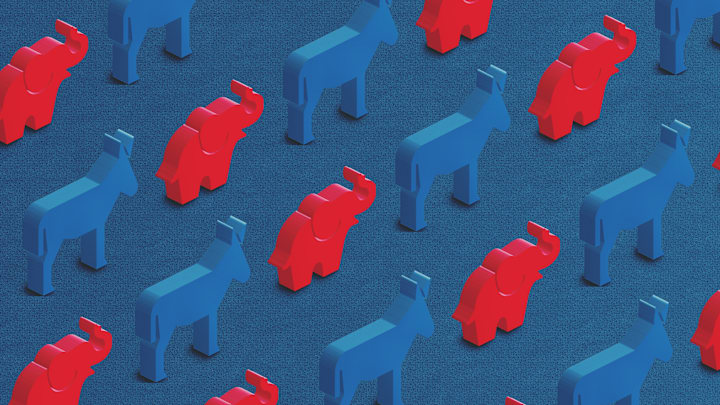You’ll often hear the Republican Party called “the GOP.” The initialism stands for Grand Old Party, and it’s a nickname Republicans have had for at least 150 years. But the history of the term—and how it came to refer to Republicans—is anything but straightforward.
The Earlier Grand Old Party
Before the Republicans called themselves “the grand old party,” the Democrats used the moniker. And why not? The Democrats are actually the older party—“the oldest political party in the United States and among the oldest political parties in the world,” per Britannica, According to CBS News, “the Democrats say their party’s earliest ancestor was a congressional caucus founded by Thomas Jefferson in 1792, which went through several forms before 1844, when it adopted the name still used today.” The Republican Party, on the other hand, dates back to the 1850s.
The Oxford English Dictionary (OED)’s oldest example of grand old party applying to the Democratic Party is from an 1858 issue of the Newark (Ohio) Advocate: “Democrats of Old Licking ...! Have you encouraged that Young Voter to unite himself at his outset in politics with that Grand Old Party which has piloted our blessed government through three-fourths of its past existence?”
But post-Civil War, things began to shift. According to History.com, “As early as the 1870s, politicians and newspapers began to refer to the Republican Party as both the ‘grand old party’ and the ‘gallant old party’ to emphasize its role in preserving the Union during the Civil War.” The OED’s first citation of GOP in reference to Republicans dates back to an 1874 issue of the Chicago Inter Ocean newspaper: “Thousands of Republicans to-day … are true to the grand old party, but desire to chasten some of its leaders.” The abbreviation GOP began popping up around 1882.

According to Washington Post reporter Leo Sands, it’s possible that the GOP name—and its connotations of a proud, long history—wasn’t intended to be taken at face value when it was first applied to the Republican Party. “That nostalgic connotation may have originally been intended with a hint of irony,” Sands wrote in 2022. “After all, the Republican Party had existed for a mere two decades—since its modern founding in 1854—when the GOP moniker first appeared print. At the time, the rival Democratic Party was more than twice its age, having been around since 1828. If either of the parties could have fairly been described as ‘old’ at the time, it would not be the Republicans.”
And for a time, it appears that grand old party was used to refer to both parties. In May 1879—just five years after the OED’s first citation for grand old party in reference to the Republican Party—a Democratic senator from Georgia said in remarks recorded in the Congressional Record [PDF], “We come back to the grand old party of the North that never went off after secession … If there are any men on this Earth for whom I have a higher regard for others, they are the democrats of the north.” Nearly a decade later, in May 1888, a Democratic representative speaking in front of the House declared that [PDF], “I am glad that I am a member of that grand old party that assures a better trade to our people, larger wages to labor, better times to the farmer, and greater glory to the American name at home and abroad.”
The Democrats also weren’t afraid to deploy the term against their opponents sarcastically. On May 1, 1888, one Democratic representative relayed an extremely elaborate and completely imagined conversation between a federal tax collector and a farmer [PDF]:
Old Farmer: Well, this is a strange thing to me; but I am a law-abiding man and I suppose I must pay. So here is your money: Give me the ticket. But before you leave I want to ask you a question.
Collector: All right; what is it?
Old Farmer: Is this Democratic doings or Republican doings?
Collector: Oh, it is the doings of the G. O. P.—the grand old party—the Republican party.
Old Farmer: Just as I expected. Well, sir, I am a Democrat and have been voting that ticket for many a year, but if Mr. Cleveland and the Democratic Party don’t bring about the old-time way of doing things … I don’t expect to vote any more.
Whigging Out
The story of grand old party doesn’t end there. To further complicate things, there’s even an older use of the term, which refers to a third party: the Whigs, which was officially founded in the 1830s in opposition to the policies of Andrew Jackson. An 1856 use of grand old party in the Boston Daily Atlas that references the Whigs (which were pretty much defunct by that time) is an outlier in the term’s history: “The course of these so-called Whigs was dreadfully discreditable to the ancient reputation of that grand old party.”
But its use shows that grand old party may have been a political term without a solid referent before gravitating to the Democrats and then moving over to the Republicans—and over time, GOP and Republicans became as synonymous as Republicans and elephants.
Read More About Politics:
